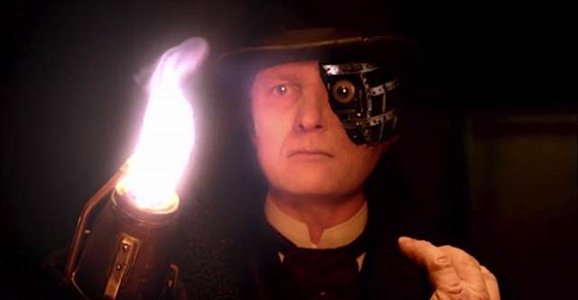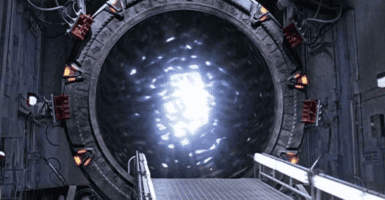Steven Moffat On Why He Chose The Season Premiere’s Déjà vu-Inducing Villains
 The Doctor Who season premiere was something of a mixed bag for me (don’t worry, they get better), but one element that was a truly pleasant surprise was the introduction of villains that seem new at first, but which you gradually realize are actually a callback to an earlier episode. It’s always fun when the Doctor references events from his other lives — although, in this case, can’t quite recall them — but the premiere’s choice of villains also raised a ton of questions. Well, now showrunner Steven Moffat has gone on the record about why he chose to pit the freshly regenerated Doctor against this particular menace.
The Doctor Who season premiere was something of a mixed bag for me (don’t worry, they get better), but one element that was a truly pleasant surprise was the introduction of villains that seem new at first, but which you gradually realize are actually a callback to an earlier episode. It’s always fun when the Doctor references events from his other lives — although, in this case, can’t quite recall them — but the premiere’s choice of villains also raised a ton of questions. Well, now showrunner Steven Moffat has gone on the record about why he chose to pit the freshly regenerated Doctor against this particular menace.
WARNING: SPOILERS FOR “DEEP BREATH” BELOW!
The body-harvesting clockwork robots of “Deep Breath” were, of course, very reminiscent of similar baddies the Tenth Doctor encountered in the excellent Moffat-scripted episode “The Girl in the Fireplace.” The Doctor even starts commenting about how his situation seems familiar, but he never quite makes the connection. Many viewers no doubt did, even before the link is made overt by the Doctor’s discovery that the robots crashed on Earth centuries ago aboard a future vessel named the S.S. Marie Antoinette, sister ship of the S.S. Madame de Pompadour from “Girl in the Fireplace.”
Given that the lead robot is also central to the episode’s peculiar finale, which clearly sets up the season’s larger story arc, it seems likely that the link to the earlier will have major significance as the season progresses. However, Moffat also had more pragmatic reasons for using the “rubbish robots from the dawn of time” as the season premiere’s baddies. During a press conference in NYC, Moffat went into detail with The Mary Sue about his choice of premiere villains:
I wanted a quite simple menace for the first episode. I didn’t want it to be wildly complicated as it were because obviously the grandstanding at the center of it is a new Doctor and a new relationship with a companion, so you really just want the villains to be lurching around offing people now and then with quite a simple backstory. But I also just quite liked the idea. I think I actually stole this joke from Columbo that the Doctor’s completely forgotten a previous adventure. Because you would. You just would. I remember there’s a lovely moment in one of the Columbos where somebody — one of the later ones where somebody is recounting one of his previous cases, and Columbo just says, ‘I’m sorry, I’ve got absolutely no idea what you’re talking about.’ [laughter] Because you would! He’s 2,000 years old, he’s forgotten the whole thing. Just that, just that. He forgot one of my episodes so I’m very cross with him!
Given how often I forget where I put my car keys, I can imagine that a centuries-old Time Lord might have trouble remembering every element of his 2,000 years. Somebody should get him a pensieve for his next birthday.
The Marie Antoinette robots served as more than just narrative placeholders, however. In addition to introducing the intriguing connection to one of the Doctor’s past adventures, their habit of harvesting organic material to keep repairing themselves played as a nice thematic parallel to the whole Time Lord process of regeneration, and more specifically the Doctor’s wondering why his new face seems so familiar. Moffat continued:
I suppose that’s why I chose those monsters, because they’ve replaced themselves continually and the Doctor is faced with the fact that he has to and he doesn’t even know where he got his face from. You could just back-date that [Editor’s Note: to our previous question]. [laughter] That’s much cleverer. Thank you! So can I now talk intelligently about that idea I forgot in my head. [laughter] Just that really — I know it seems preposterous in a way that you’re obliged to sit in a room and think seriously, what would it be like if you were Matt Smith one moment and Peter Capaldi the next, what would that be like? It’s not a general life experience. It’s not something that’s ever happened to me, for instance. But you have to take it seriously and you have to sort of think, it must be frightening. And it must be frightening when you look at your best friend in the whole world, because that’s where I put that line in about seeing. You look at your best friend in the whole world, the person on whom you are anchored, and they don’t see you. They literally look at you and look right through you and they see something else. And you still feel the same. You’re looking this way. You feel a bit different. But if someone’s looking back and not seeing you, how frightening that must be. Not to have your only basic irremovable right, the right to be yourself. The Doctor periodically has that removed from him.
The Doctor will face off against an old, familiar enemy this Saturday night on BBC America, in an episode entitled “Into the Dalek.”











